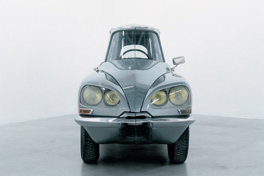Gabriel Orozco
dal 17/4/2010 al 7/8/2010
Segnalato da
17/4/2010
Gabriel Orozco
Kunstmuseum Basel, Basel
This major survey shows installations, sculptures, photographs, paintings and drawings. The nomadic way of life typical of his generation and the principle of constant movement surface in his work in many different ways, ranging from the photograph of his breath on a piano to a Citroen DS that has been sliced lengthwise down the middle and reassembled as a one seater. Orozco has a penchant for exploiting the expressive artistic potential that lies in the ephemeral.

Curator of the exhibition: Bernhard Mendes Bürgi
This major survey at Kunstmuseum Basel shows installations, sculptures, photographs,
paintings and drawings by Gabriel Orozco (born 1962 in Mexico), created since the early
1990s. Orozco, one of the world’s foremost contemporary artists, commutes between New
York, Paris and Mexico City. The nomadic way of life typical of his generation and the
principle of constant movement surface in his work in many different ways.
While the earliest works on view were still made in Mexico, to which he regularly returns, the
context of Gabriel Orozco’s art since 1992 has been the accelerated throwaway society of North
America and Western Europe, particularly New York and Paris. Seamlessly and symbiotically,
Orozco unites many different levels of social and visual cultural experience with his Latin American
roots.
He has a penchant for exploiting the expressive artistic potential that lies in ephemeral encounters
with life on the streets, wherever he may be. He directs his attention to inconspicuous situations and
materials, showing a light-footed ease and subtlety in strikingly combining and reconfiguring his
findings within the larger context. Throughout, it is the nomadic principle and the readiness to
embrace the moment that coalesce into visual artefacts, covering a wide spectrum from his breath
on a piano, captured in a photograph, to a Citroën DS, sliced lengthwise down the middle and
reassembled as a one seater.
Orozco explores the marginal zones of perception, changing vantage points and locations in a
continuum of ceaseless transformation. Tellingly, we repeatedly find ciphers of organic movement
as in the Atomists, 1996, drawn configurations of circular shapes and segments that transform
explosively compressed newspaper pictures of team sports into cosmological visions.
Orozco’s Working Tables (Mexico 1991–2006), 2006, from the collection of the Kunstmuseum
Basel, excellently demonstrate that the formal aspect of his art does not rely on what is available or
made: it is an activity. Created in Mexico City, the Tables are an accumulation of small-format
objects and found pieces. Between 1991 and 2006, Orozco periodically worked on small sculptures,
like balls made of orange peel and modelling clay or cardboard structures, but, above all, he
collected and modified found pieces, activating the artistic potential of such diverse items as the
inside of a football, rusty scrap iron, the bones of a whale or plastic fried eggs. He stored these
objects at his home in Mexico City as a sculptural source of inspiration, like a sketchbook, filled with
countless tentative attempts to give shape to artistic ideas and keep an unfiltered record of their
effectiveness. These experiments with the things of everyday life and with sculptural processes are
a cross between workshop and worldview, exhibiting untold varieties of organic transformation and
interaction.
The exhibition is organised by The Museum of Modern Art, New York, in cooperation with
the Kunstmuseum Basel, the Musée national d’art moderne – Centre Georges Pompidou,
Paris, and Tate Modern, London. It is generously supported by The National Council for
Culture and the Arts (CONACULTA) / Fundación Televisa, Mexico.
Image: La DS. 1993, Modified Citroën DS, 55 3/16 x 15' 9 15/16" x 45 5/16" (140.1 x 482.5 x 115.1 cm)
Fonds national d’art contemporain (Cnap), Ministère de la Culture et de la Communication, Paris, Fnac 94003 ©2009 Gabriel Orozco
Press office Kunstmuseum Basel
Christian Selz Phone +41 61 2066206 Fax +41 61 2066252 pressoffice@kunstmuseumbasel.ch
Kunstmuseum Basel
St. Alban-Graben 16, Basel
Opening Hours Tue - Sun 10 a.m. - 6 p.m.
closed on Monday
Admission:
Adults, over 18 years 11.00 Euro
Family pass (2 adults + adolescents) 22.00 Euro
Groups (more than 20 pers.) 9.00 Euro
Students (13-30 years) 4.00 Euro
Children, under 12 years free
Audio-guide (collection) 1.50 Euro



